Analysis of Sustainable Engineering Management for a Better Future
VerifiedAdded on 2021/12/16
|10
|2723
|58
Report
AI Summary
This report delves into the critical aspects of sustainable engineering management, emphasizing the need for engineering leaders to adopt specific management skills for a sustainable future. It outlines key strategies such as developing manageable strategies, partnering with sustainable ven...

1
Engineering Management For Sustainable Future
Engineering Management For Sustainable Future
Paraphrase This Document
Need a fresh take? Get an instant paraphrase of this document with our AI Paraphraser
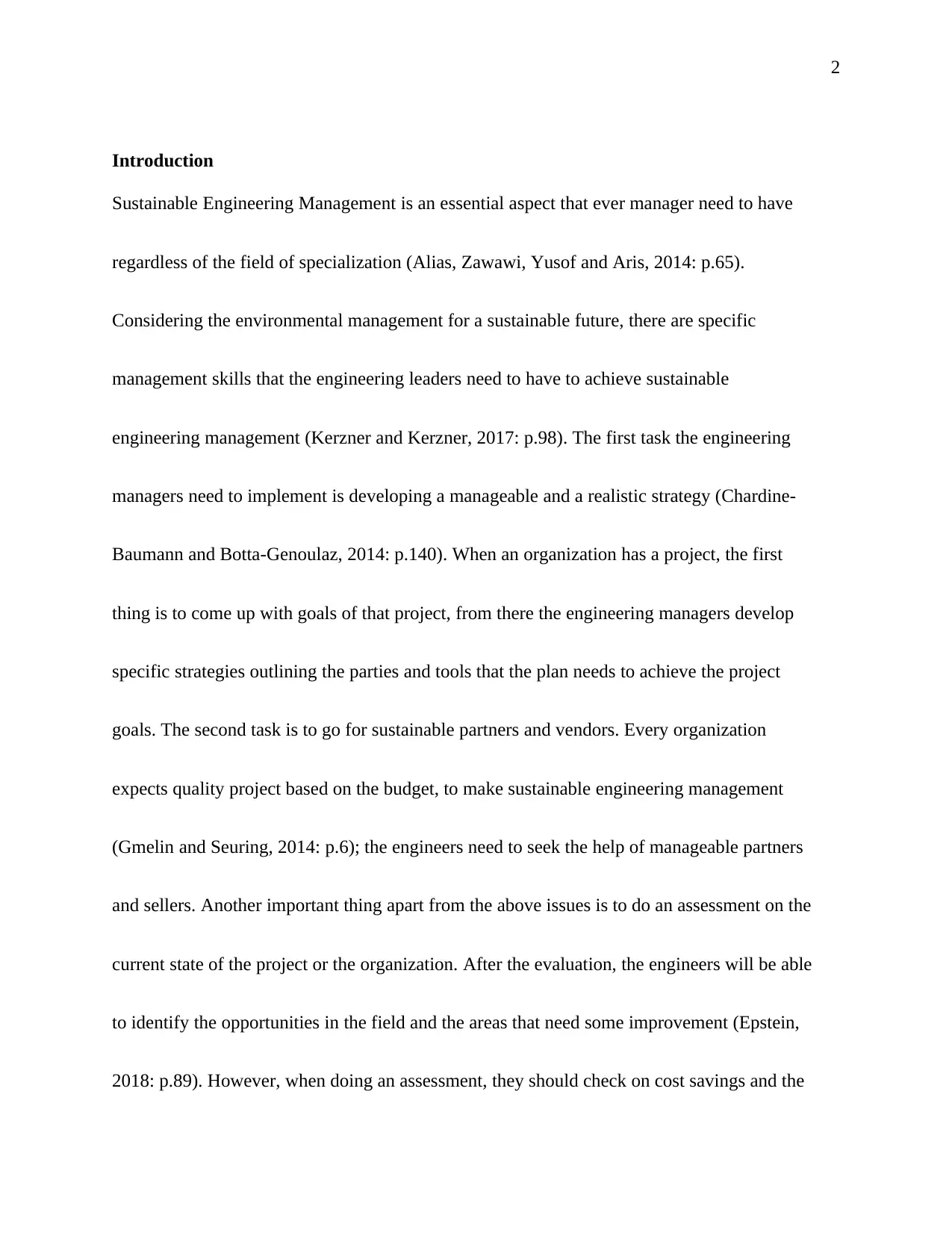
2
Introduction
Sustainable Engineering Management is an essential aspect that ever manager need to have
regardless of the field of specialization (Alias, Zawawi, Yusof and Aris, 2014: p.65).
Considering the environmental management for a sustainable future, there are specific
management skills that the engineering leaders need to have to achieve sustainable
engineering management (Kerzner and Kerzner, 2017: p.98). The first task the engineering
managers need to implement is developing a manageable and a realistic strategy (Chardine-
Baumann and Botta-Genoulaz, 2014: p.140). When an organization has a project, the first
thing is to come up with goals of that project, from there the engineering managers develop
specific strategies outlining the parties and tools that the plan needs to achieve the project
goals. The second task is to go for sustainable partners and vendors. Every organization
expects quality project based on the budget, to make sustainable engineering management
(Gmelin and Seuring, 2014: p.6); the engineers need to seek the help of manageable partners
and sellers. Another important thing apart from the above issues is to do an assessment on the
current state of the project or the organization. After the evaluation, the engineers will be able
to identify the opportunities in the field and the areas that need some improvement (Epstein,
2018: p.89). However, when doing an assessment, they should check on cost savings and the
Introduction
Sustainable Engineering Management is an essential aspect that ever manager need to have
regardless of the field of specialization (Alias, Zawawi, Yusof and Aris, 2014: p.65).
Considering the environmental management for a sustainable future, there are specific
management skills that the engineering leaders need to have to achieve sustainable
engineering management (Kerzner and Kerzner, 2017: p.98). The first task the engineering
managers need to implement is developing a manageable and a realistic strategy (Chardine-
Baumann and Botta-Genoulaz, 2014: p.140). When an organization has a project, the first
thing is to come up with goals of that project, from there the engineering managers develop
specific strategies outlining the parties and tools that the plan needs to achieve the project
goals. The second task is to go for sustainable partners and vendors. Every organization
expects quality project based on the budget, to make sustainable engineering management
(Gmelin and Seuring, 2014: p.6); the engineers need to seek the help of manageable partners
and sellers. Another important thing apart from the above issues is to do an assessment on the
current state of the project or the organization. After the evaluation, the engineers will be able
to identify the opportunities in the field and the areas that need some improvement (Epstein,
2018: p.89). However, when doing an assessment, they should check on cost savings and the
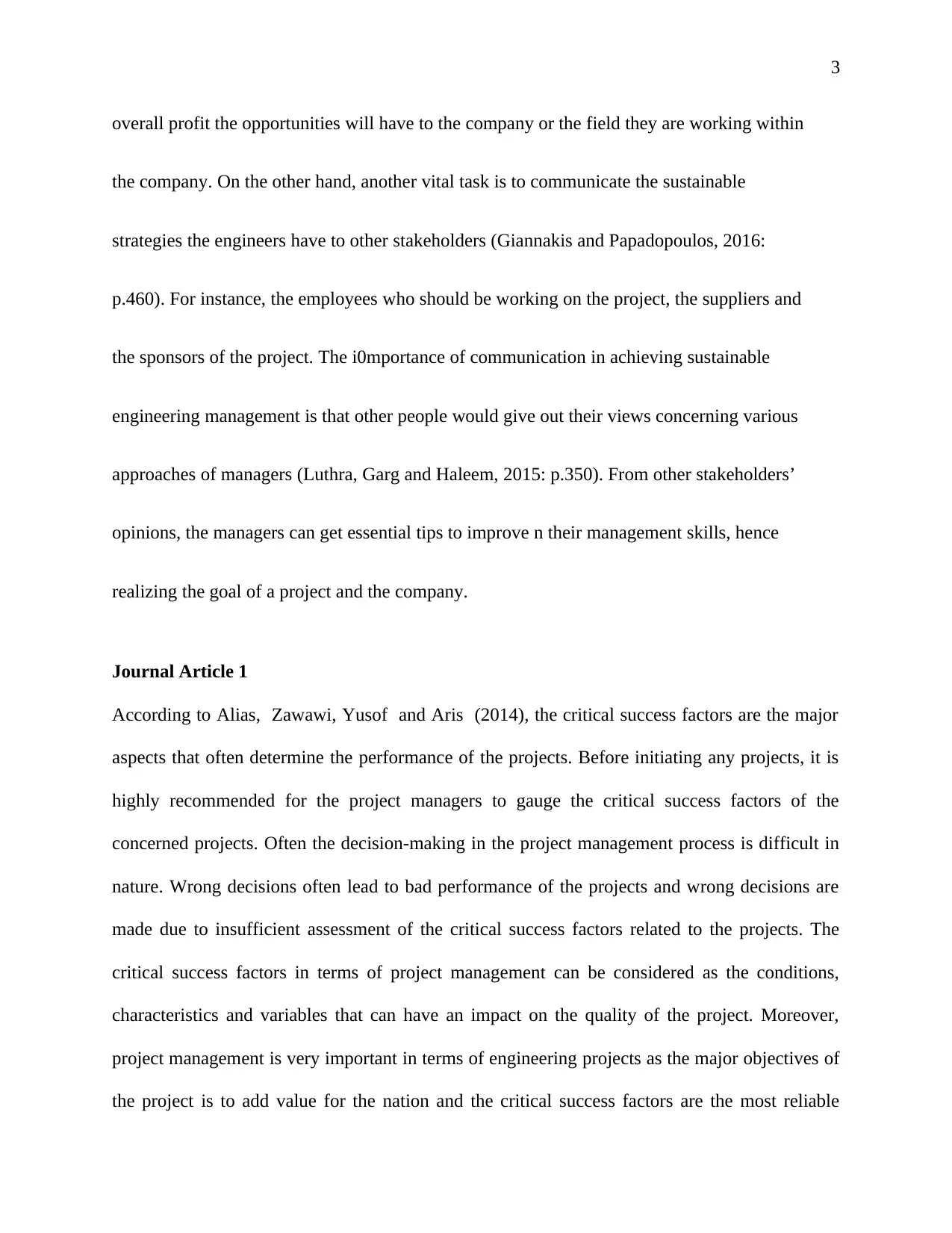
3
overall profit the opportunities will have to the company or the field they are working within
the company. On the other hand, another vital task is to communicate the sustainable
strategies the engineers have to other stakeholders (Giannakis and Papadopoulos, 2016:
p.460). For instance, the employees who should be working on the project, the suppliers and
the sponsors of the project. The i0mportance of communication in achieving sustainable
engineering management is that other people would give out their views concerning various
approaches of managers (Luthra, Garg and Haleem, 2015: p.350). From other stakeholders’
opinions, the managers can get essential tips to improve n their management skills, hence
realizing the goal of a project and the company.
Journal Article 1
According to Alias, Zawawi, Yusof and Aris (2014), the critical success factors are the major
aspects that often determine the performance of the projects. Before initiating any projects, it is
highly recommended for the project managers to gauge the critical success factors of the
concerned projects. Often the decision-making in the project management process is difficult in
nature. Wrong decisions often lead to bad performance of the projects and wrong decisions are
made due to insufficient assessment of the critical success factors related to the projects. The
critical success factors in terms of project management can be considered as the conditions,
characteristics and variables that can have an impact on the quality of the project. Moreover,
project management is very important in terms of engineering projects as the major objectives of
the project is to add value for the nation and the critical success factors are the most reliable
overall profit the opportunities will have to the company or the field they are working within
the company. On the other hand, another vital task is to communicate the sustainable
strategies the engineers have to other stakeholders (Giannakis and Papadopoulos, 2016:
p.460). For instance, the employees who should be working on the project, the suppliers and
the sponsors of the project. The i0mportance of communication in achieving sustainable
engineering management is that other people would give out their views concerning various
approaches of managers (Luthra, Garg and Haleem, 2015: p.350). From other stakeholders’
opinions, the managers can get essential tips to improve n their management skills, hence
realizing the goal of a project and the company.
Journal Article 1
According to Alias, Zawawi, Yusof and Aris (2014), the critical success factors are the major
aspects that often determine the performance of the projects. Before initiating any projects, it is
highly recommended for the project managers to gauge the critical success factors of the
concerned projects. Often the decision-making in the project management process is difficult in
nature. Wrong decisions often lead to bad performance of the projects and wrong decisions are
made due to insufficient assessment of the critical success factors related to the projects. The
critical success factors in terms of project management can be considered as the conditions,
characteristics and variables that can have an impact on the quality of the project. Moreover,
project management is very important in terms of engineering projects as the major objectives of
the project is to add value for the nation and the critical success factors are the most reliable
⊘ This is a preview!⊘
Do you want full access?
Subscribe today to unlock all pages.

Trusted by 1+ million students worldwide
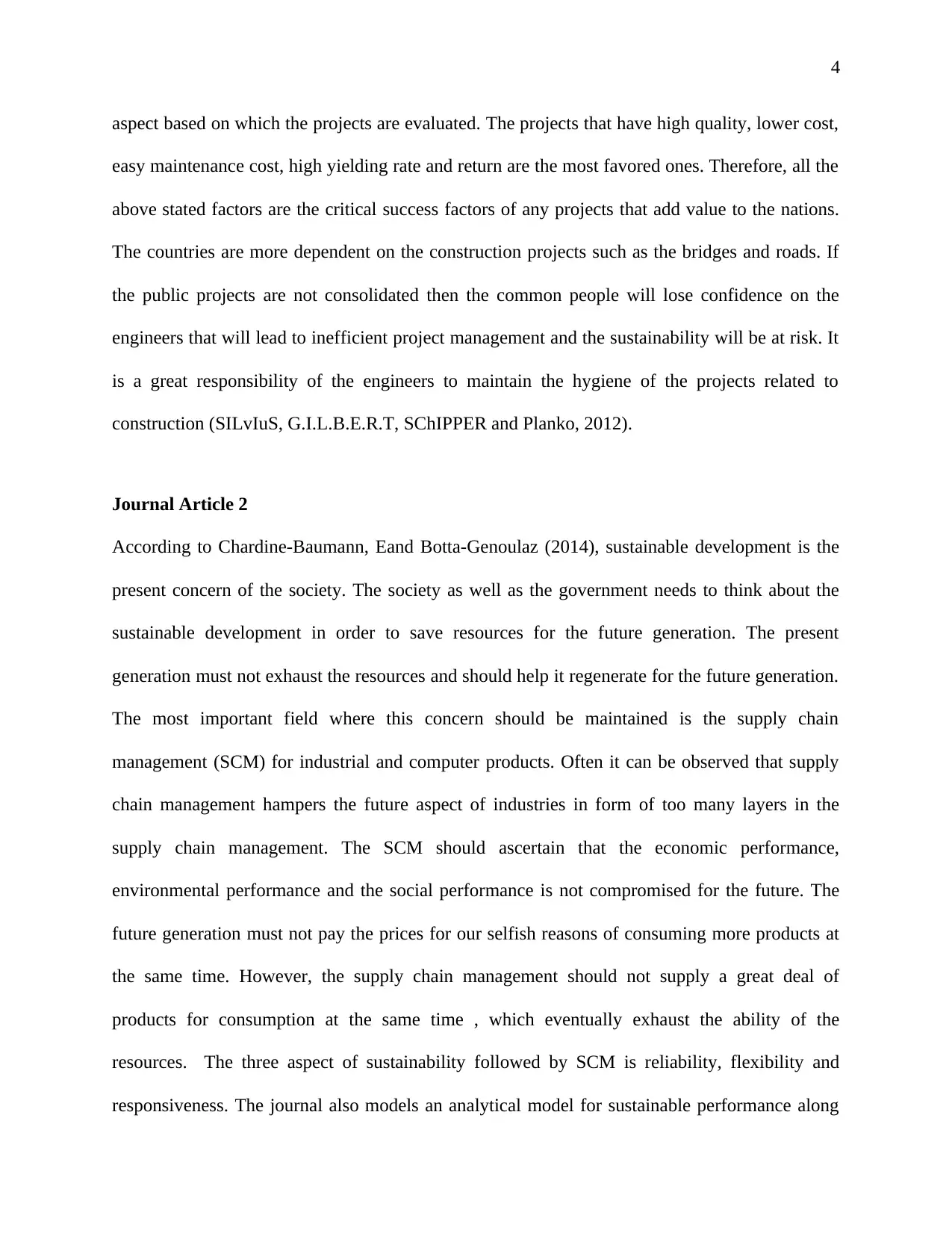
4
aspect based on which the projects are evaluated. The projects that have high quality, lower cost,
easy maintenance cost, high yielding rate and return are the most favored ones. Therefore, all the
above stated factors are the critical success factors of any projects that add value to the nations.
The countries are more dependent on the construction projects such as the bridges and roads. If
the public projects are not consolidated then the common people will lose confidence on the
engineers that will lead to inefficient project management and the sustainability will be at risk. It
is a great responsibility of the engineers to maintain the hygiene of the projects related to
construction (SILvIuS, G.I.L.B.E.R.T, SChIPPER and Planko, 2012).
Journal Article 2
According to Chardine-Baumann, Eand Botta-Genoulaz (2014), sustainable development is the
present concern of the society. The society as well as the government needs to think about the
sustainable development in order to save resources for the future generation. The present
generation must not exhaust the resources and should help it regenerate for the future generation.
The most important field where this concern should be maintained is the supply chain
management (SCM) for industrial and computer products. Often it can be observed that supply
chain management hampers the future aspect of industries in form of too many layers in the
supply chain management. The SCM should ascertain that the economic performance,
environmental performance and the social performance is not compromised for the future. The
future generation must not pay the prices for our selfish reasons of consuming more products at
the same time. However, the supply chain management should not supply a great deal of
products for consumption at the same time , which eventually exhaust the ability of the
resources. The three aspect of sustainability followed by SCM is reliability, flexibility and
responsiveness. The journal also models an analytical model for sustainable performance along
aspect based on which the projects are evaluated. The projects that have high quality, lower cost,
easy maintenance cost, high yielding rate and return are the most favored ones. Therefore, all the
above stated factors are the critical success factors of any projects that add value to the nations.
The countries are more dependent on the construction projects such as the bridges and roads. If
the public projects are not consolidated then the common people will lose confidence on the
engineers that will lead to inefficient project management and the sustainability will be at risk. It
is a great responsibility of the engineers to maintain the hygiene of the projects related to
construction (SILvIuS, G.I.L.B.E.R.T, SChIPPER and Planko, 2012).
Journal Article 2
According to Chardine-Baumann, Eand Botta-Genoulaz (2014), sustainable development is the
present concern of the society. The society as well as the government needs to think about the
sustainable development in order to save resources for the future generation. The present
generation must not exhaust the resources and should help it regenerate for the future generation.
The most important field where this concern should be maintained is the supply chain
management (SCM) for industrial and computer products. Often it can be observed that supply
chain management hampers the future aspect of industries in form of too many layers in the
supply chain management. The SCM should ascertain that the economic performance,
environmental performance and the social performance is not compromised for the future. The
future generation must not pay the prices for our selfish reasons of consuming more products at
the same time. However, the supply chain management should not supply a great deal of
products for consumption at the same time , which eventually exhaust the ability of the
resources. The three aspect of sustainability followed by SCM is reliability, flexibility and
responsiveness. The journal also models an analytical model for sustainable performance along
Paraphrase This Document
Need a fresh take? Get an instant paraphrase of this document with our AI Paraphraser
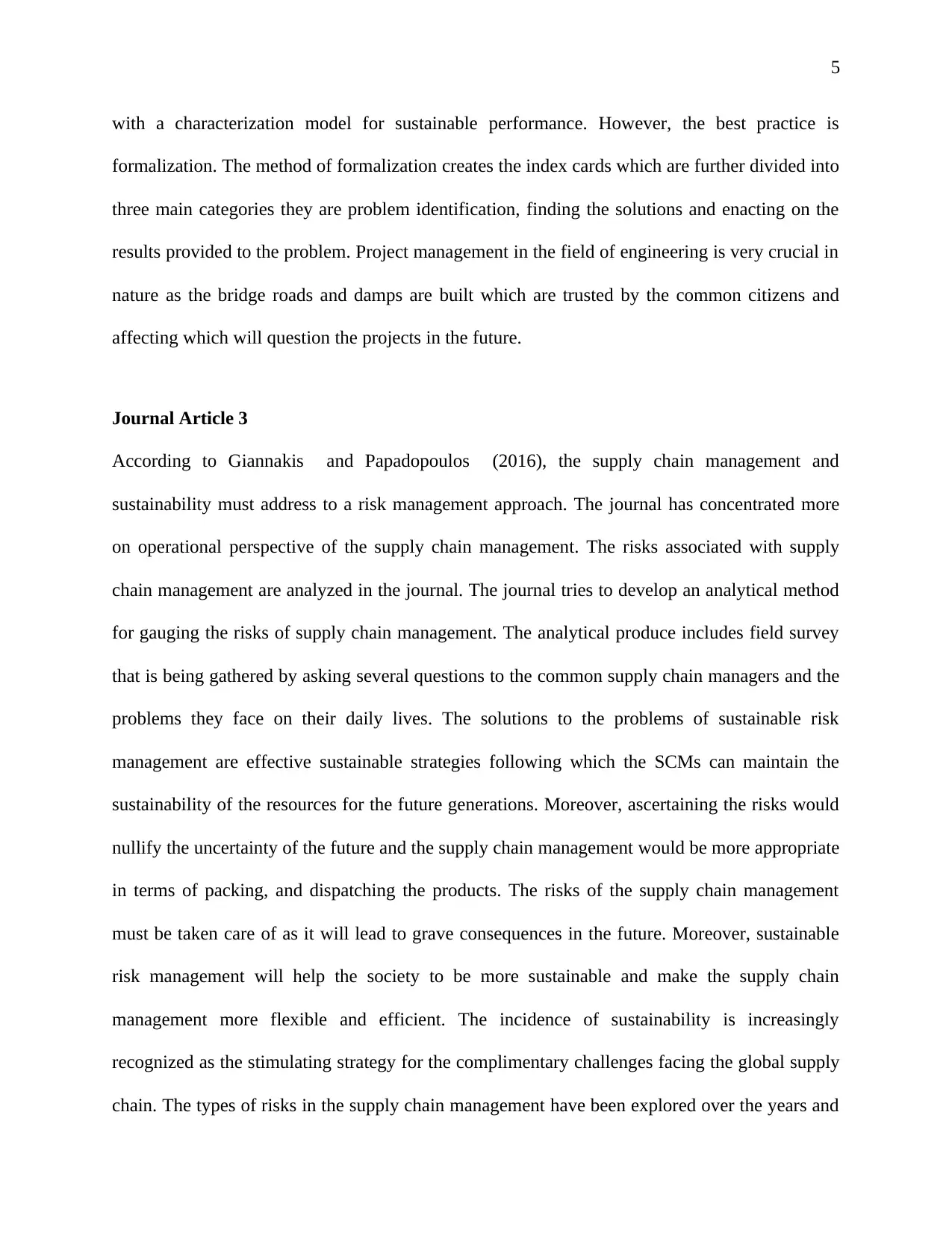
5
with a characterization model for sustainable performance. However, the best practice is
formalization. The method of formalization creates the index cards which are further divided into
three main categories they are problem identification, finding the solutions and enacting on the
results provided to the problem. Project management in the field of engineering is very crucial in
nature as the bridge roads and damps are built which are trusted by the common citizens and
affecting which will question the projects in the future.
Journal Article 3
According to Giannakis and Papadopoulos (2016), the supply chain management and
sustainability must address to a risk management approach. The journal has concentrated more
on operational perspective of the supply chain management. The risks associated with supply
chain management are analyzed in the journal. The journal tries to develop an analytical method
for gauging the risks of supply chain management. The analytical produce includes field survey
that is being gathered by asking several questions to the common supply chain managers and the
problems they face on their daily lives. The solutions to the problems of sustainable risk
management are effective sustainable strategies following which the SCMs can maintain the
sustainability of the resources for the future generations. Moreover, ascertaining the risks would
nullify the uncertainty of the future and the supply chain management would be more appropriate
in terms of packing, and dispatching the products. The risks of the supply chain management
must be taken care of as it will lead to grave consequences in the future. Moreover, sustainable
risk management will help the society to be more sustainable and make the supply chain
management more flexible and efficient. The incidence of sustainability is increasingly
recognized as the stimulating strategy for the complimentary challenges facing the global supply
chain. The types of risks in the supply chain management have been explored over the years and
with a characterization model for sustainable performance. However, the best practice is
formalization. The method of formalization creates the index cards which are further divided into
three main categories they are problem identification, finding the solutions and enacting on the
results provided to the problem. Project management in the field of engineering is very crucial in
nature as the bridge roads and damps are built which are trusted by the common citizens and
affecting which will question the projects in the future.
Journal Article 3
According to Giannakis and Papadopoulos (2016), the supply chain management and
sustainability must address to a risk management approach. The journal has concentrated more
on operational perspective of the supply chain management. The risks associated with supply
chain management are analyzed in the journal. The journal tries to develop an analytical method
for gauging the risks of supply chain management. The analytical produce includes field survey
that is being gathered by asking several questions to the common supply chain managers and the
problems they face on their daily lives. The solutions to the problems of sustainable risk
management are effective sustainable strategies following which the SCMs can maintain the
sustainability of the resources for the future generations. Moreover, ascertaining the risks would
nullify the uncertainty of the future and the supply chain management would be more appropriate
in terms of packing, and dispatching the products. The risks of the supply chain management
must be taken care of as it will lead to grave consequences in the future. Moreover, sustainable
risk management will help the society to be more sustainable and make the supply chain
management more flexible and efficient. The incidence of sustainability is increasingly
recognized as the stimulating strategy for the complimentary challenges facing the global supply
chain. The types of risks in the supply chain management have been explored over the years and
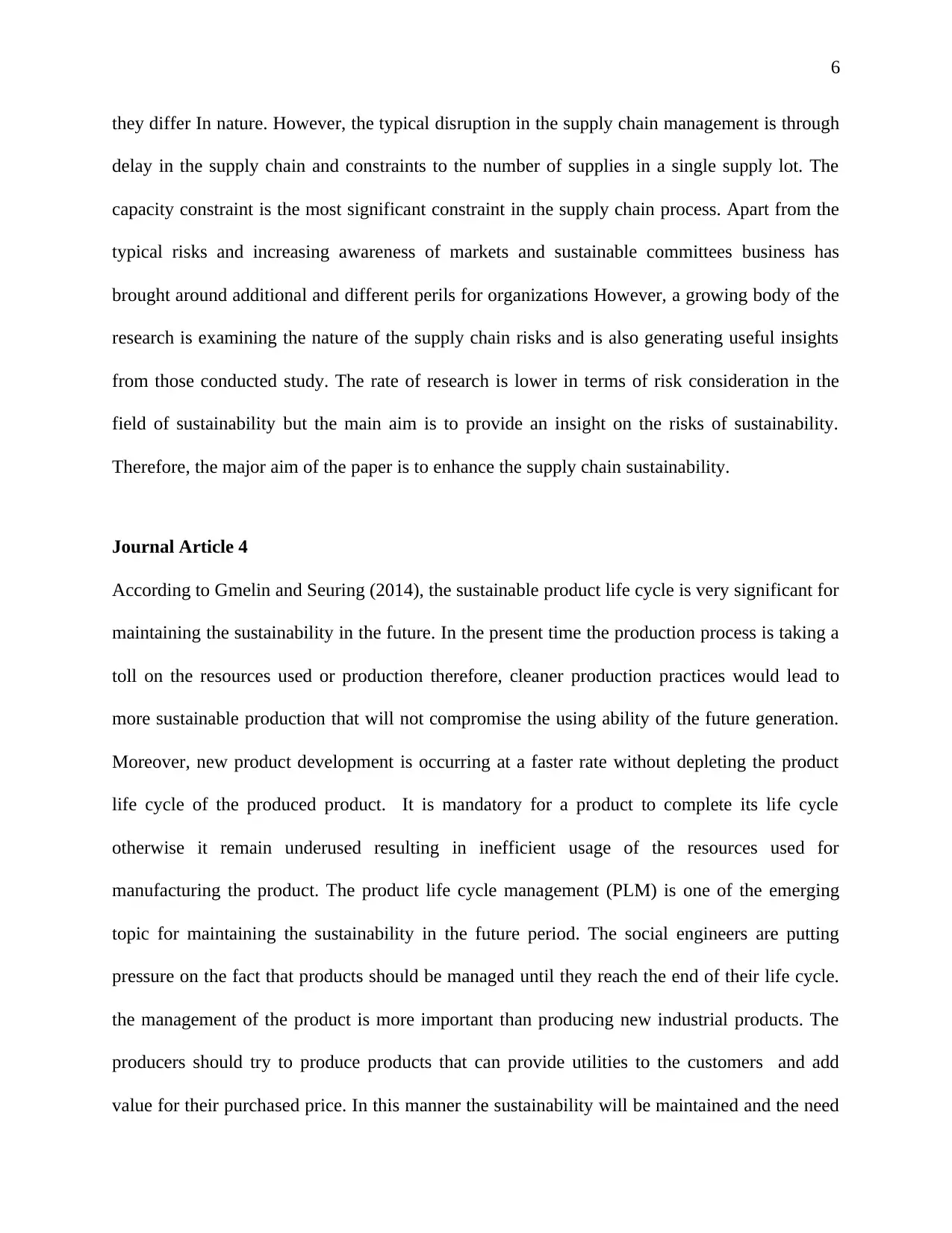
6
they differ In nature. However, the typical disruption in the supply chain management is through
delay in the supply chain and constraints to the number of supplies in a single supply lot. The
capacity constraint is the most significant constraint in the supply chain process. Apart from the
typical risks and increasing awareness of markets and sustainable committees business has
brought around additional and different perils for organizations However, a growing body of the
research is examining the nature of the supply chain risks and is also generating useful insights
from those conducted study. The rate of research is lower in terms of risk consideration in the
field of sustainability but the main aim is to provide an insight on the risks of sustainability.
Therefore, the major aim of the paper is to enhance the supply chain sustainability.
Journal Article 4
According to Gmelin and Seuring (2014), the sustainable product life cycle is very significant for
maintaining the sustainability in the future. In the present time the production process is taking a
toll on the resources used or production therefore, cleaner production practices would lead to
more sustainable production that will not compromise the using ability of the future generation.
Moreover, new product development is occurring at a faster rate without depleting the product
life cycle of the produced product. It is mandatory for a product to complete its life cycle
otherwise it remain underused resulting in inefficient usage of the resources used for
manufacturing the product. The product life cycle management (PLM) is one of the emerging
topic for maintaining the sustainability in the future period. The social engineers are putting
pressure on the fact that products should be managed until they reach the end of their life cycle.
the management of the product is more important than producing new industrial products. The
producers should try to produce products that can provide utilities to the customers and add
value for their purchased price. In this manner the sustainability will be maintained and the need
they differ In nature. However, the typical disruption in the supply chain management is through
delay in the supply chain and constraints to the number of supplies in a single supply lot. The
capacity constraint is the most significant constraint in the supply chain process. Apart from the
typical risks and increasing awareness of markets and sustainable committees business has
brought around additional and different perils for organizations However, a growing body of the
research is examining the nature of the supply chain risks and is also generating useful insights
from those conducted study. The rate of research is lower in terms of risk consideration in the
field of sustainability but the main aim is to provide an insight on the risks of sustainability.
Therefore, the major aim of the paper is to enhance the supply chain sustainability.
Journal Article 4
According to Gmelin and Seuring (2014), the sustainable product life cycle is very significant for
maintaining the sustainability in the future. In the present time the production process is taking a
toll on the resources used or production therefore, cleaner production practices would lead to
more sustainable production that will not compromise the using ability of the future generation.
Moreover, new product development is occurring at a faster rate without depleting the product
life cycle of the produced product. It is mandatory for a product to complete its life cycle
otherwise it remain underused resulting in inefficient usage of the resources used for
manufacturing the product. The product life cycle management (PLM) is one of the emerging
topic for maintaining the sustainability in the future period. The social engineers are putting
pressure on the fact that products should be managed until they reach the end of their life cycle.
the management of the product is more important than producing new industrial products. The
producers should try to produce products that can provide utilities to the customers and add
value for their purchased price. In this manner the sustainability will be maintained and the need
⊘ This is a preview!⊘
Do you want full access?
Subscribe today to unlock all pages.

Trusted by 1+ million students worldwide
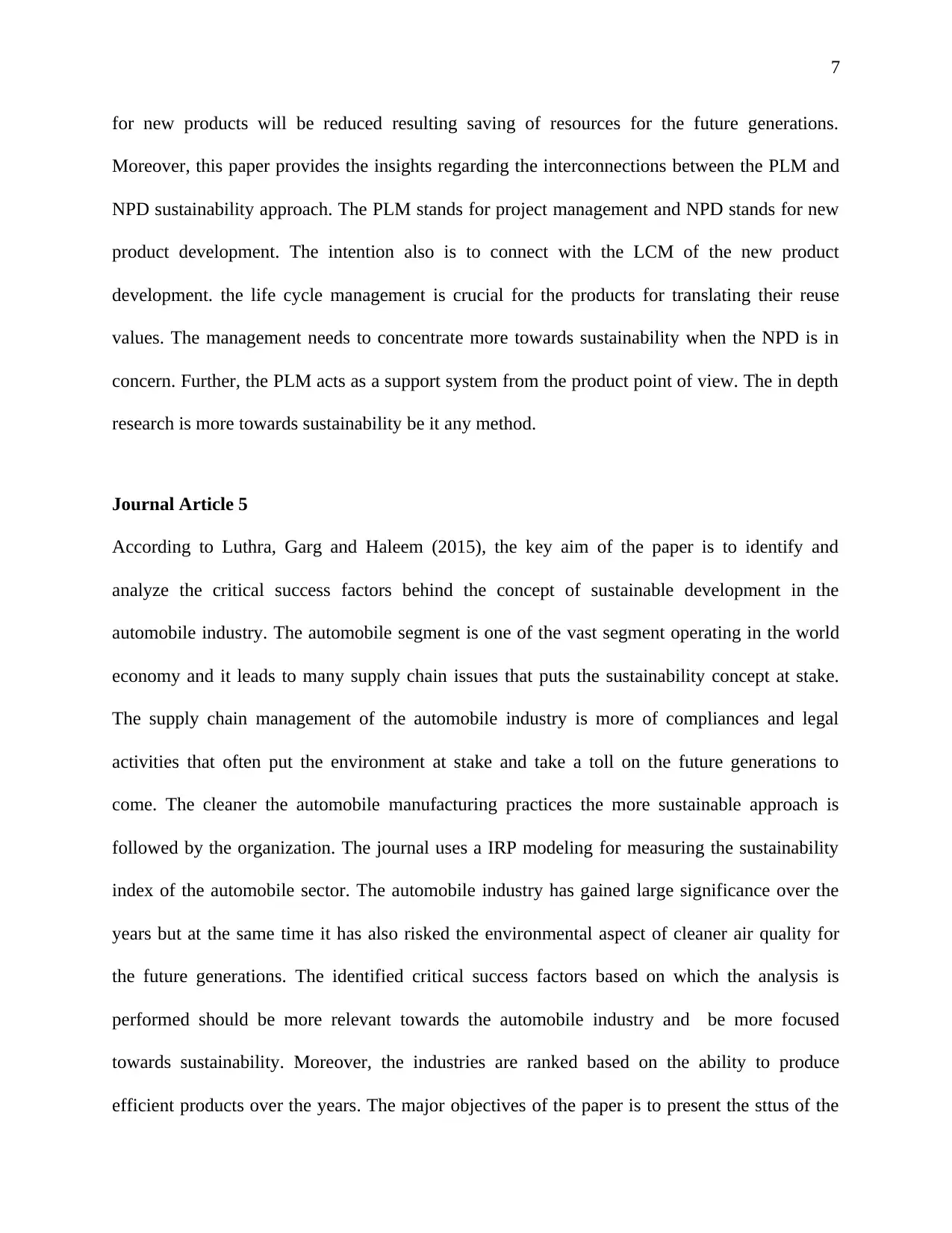
7
for new products will be reduced resulting saving of resources for the future generations.
Moreover, this paper provides the insights regarding the interconnections between the PLM and
NPD sustainability approach. The PLM stands for project management and NPD stands for new
product development. The intention also is to connect with the LCM of the new product
development. the life cycle management is crucial for the products for translating their reuse
values. The management needs to concentrate more towards sustainability when the NPD is in
concern. Further, the PLM acts as a support system from the product point of view. The in depth
research is more towards sustainability be it any method.
Journal Article 5
According to Luthra, Garg and Haleem (2015), the key aim of the paper is to identify and
analyze the critical success factors behind the concept of sustainable development in the
automobile industry. The automobile segment is one of the vast segment operating in the world
economy and it leads to many supply chain issues that puts the sustainability concept at stake.
The supply chain management of the automobile industry is more of compliances and legal
activities that often put the environment at stake and take a toll on the future generations to
come. The cleaner the automobile manufacturing practices the more sustainable approach is
followed by the organization. The journal uses a IRP modeling for measuring the sustainability
index of the automobile sector. The automobile industry has gained large significance over the
years but at the same time it has also risked the environmental aspect of cleaner air quality for
the future generations. The identified critical success factors based on which the analysis is
performed should be more relevant towards the automobile industry and be more focused
towards sustainability. Moreover, the industries are ranked based on the ability to produce
efficient products over the years. The major objectives of the paper is to present the sttus of the
for new products will be reduced resulting saving of resources for the future generations.
Moreover, this paper provides the insights regarding the interconnections between the PLM and
NPD sustainability approach. The PLM stands for project management and NPD stands for new
product development. The intention also is to connect with the LCM of the new product
development. the life cycle management is crucial for the products for translating their reuse
values. The management needs to concentrate more towards sustainability when the NPD is in
concern. Further, the PLM acts as a support system from the product point of view. The in depth
research is more towards sustainability be it any method.
Journal Article 5
According to Luthra, Garg and Haleem (2015), the key aim of the paper is to identify and
analyze the critical success factors behind the concept of sustainable development in the
automobile industry. The automobile segment is one of the vast segment operating in the world
economy and it leads to many supply chain issues that puts the sustainability concept at stake.
The supply chain management of the automobile industry is more of compliances and legal
activities that often put the environment at stake and take a toll on the future generations to
come. The cleaner the automobile manufacturing practices the more sustainable approach is
followed by the organization. The journal uses a IRP modeling for measuring the sustainability
index of the automobile sector. The automobile industry has gained large significance over the
years but at the same time it has also risked the environmental aspect of cleaner air quality for
the future generations. The identified critical success factors based on which the analysis is
performed should be more relevant towards the automobile industry and be more focused
towards sustainability. Moreover, the industries are ranked based on the ability to produce
efficient products over the years. The major objectives of the paper is to present the sttus of the
Paraphrase This Document
Need a fresh take? Get an instant paraphrase of this document with our AI Paraphraser
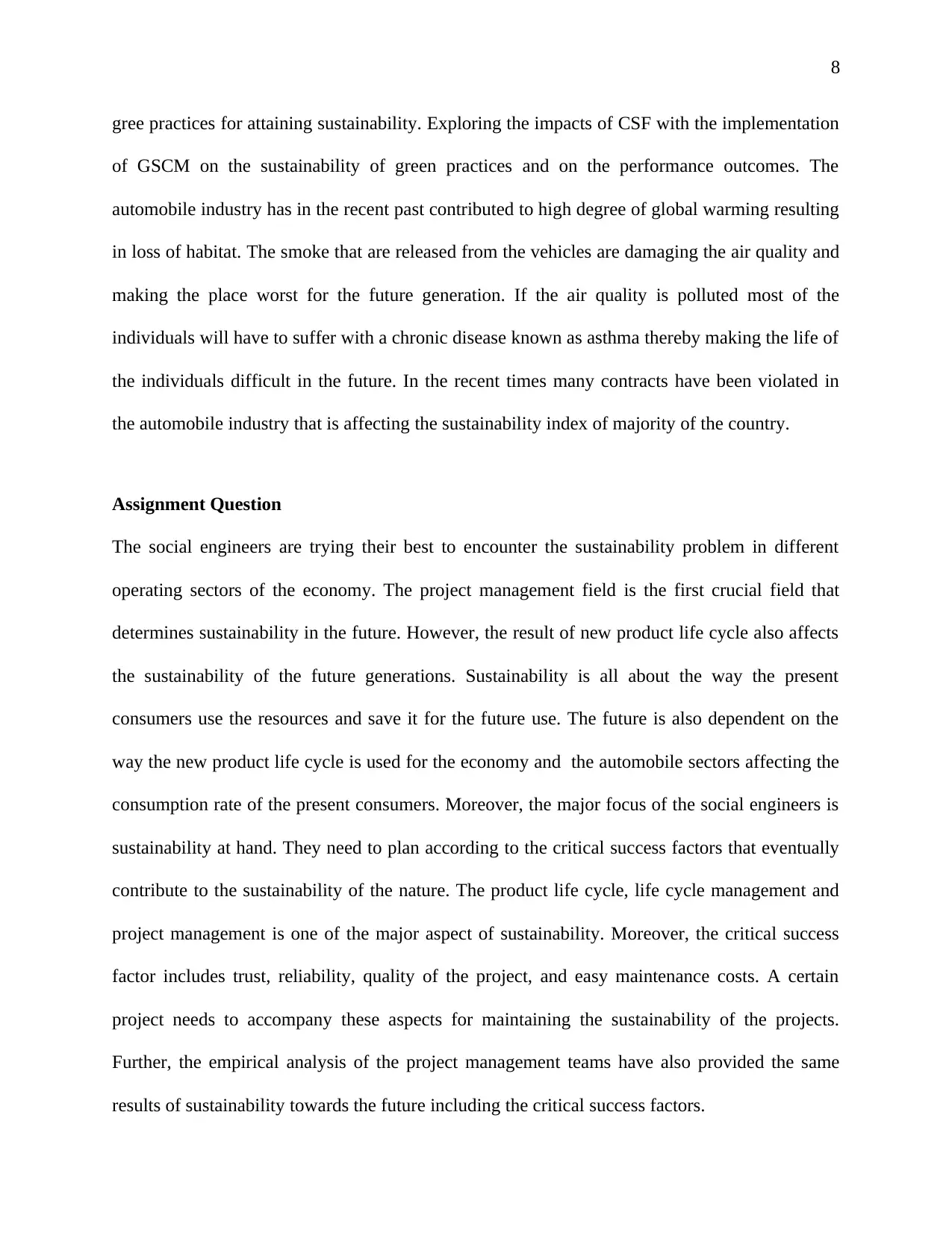
8
gree practices for attaining sustainability. Exploring the impacts of CSF with the implementation
of GSCM on the sustainability of green practices and on the performance outcomes. The
automobile industry has in the recent past contributed to high degree of global warming resulting
in loss of habitat. The smoke that are released from the vehicles are damaging the air quality and
making the place worst for the future generation. If the air quality is polluted most of the
individuals will have to suffer with a chronic disease known as asthma thereby making the life of
the individuals difficult in the future. In the recent times many contracts have been violated in
the automobile industry that is affecting the sustainability index of majority of the country.
Assignment Question
The social engineers are trying their best to encounter the sustainability problem in different
operating sectors of the economy. The project management field is the first crucial field that
determines sustainability in the future. However, the result of new product life cycle also affects
the sustainability of the future generations. Sustainability is all about the way the present
consumers use the resources and save it for the future use. The future is also dependent on the
way the new product life cycle is used for the economy and the automobile sectors affecting the
consumption rate of the present consumers. Moreover, the major focus of the social engineers is
sustainability at hand. They need to plan according to the critical success factors that eventually
contribute to the sustainability of the nature. The product life cycle, life cycle management and
project management is one of the major aspect of sustainability. Moreover, the critical success
factor includes trust, reliability, quality of the project, and easy maintenance costs. A certain
project needs to accompany these aspects for maintaining the sustainability of the projects.
Further, the empirical analysis of the project management teams have also provided the same
results of sustainability towards the future including the critical success factors.
gree practices for attaining sustainability. Exploring the impacts of CSF with the implementation
of GSCM on the sustainability of green practices and on the performance outcomes. The
automobile industry has in the recent past contributed to high degree of global warming resulting
in loss of habitat. The smoke that are released from the vehicles are damaging the air quality and
making the place worst for the future generation. If the air quality is polluted most of the
individuals will have to suffer with a chronic disease known as asthma thereby making the life of
the individuals difficult in the future. In the recent times many contracts have been violated in
the automobile industry that is affecting the sustainability index of majority of the country.
Assignment Question
The social engineers are trying their best to encounter the sustainability problem in different
operating sectors of the economy. The project management field is the first crucial field that
determines sustainability in the future. However, the result of new product life cycle also affects
the sustainability of the future generations. Sustainability is all about the way the present
consumers use the resources and save it for the future use. The future is also dependent on the
way the new product life cycle is used for the economy and the automobile sectors affecting the
consumption rate of the present consumers. Moreover, the major focus of the social engineers is
sustainability at hand. They need to plan according to the critical success factors that eventually
contribute to the sustainability of the nature. The product life cycle, life cycle management and
project management is one of the major aspect of sustainability. Moreover, the critical success
factor includes trust, reliability, quality of the project, and easy maintenance costs. A certain
project needs to accompany these aspects for maintaining the sustainability of the projects.
Further, the empirical analysis of the project management teams have also provided the same
results of sustainability towards the future including the critical success factors.
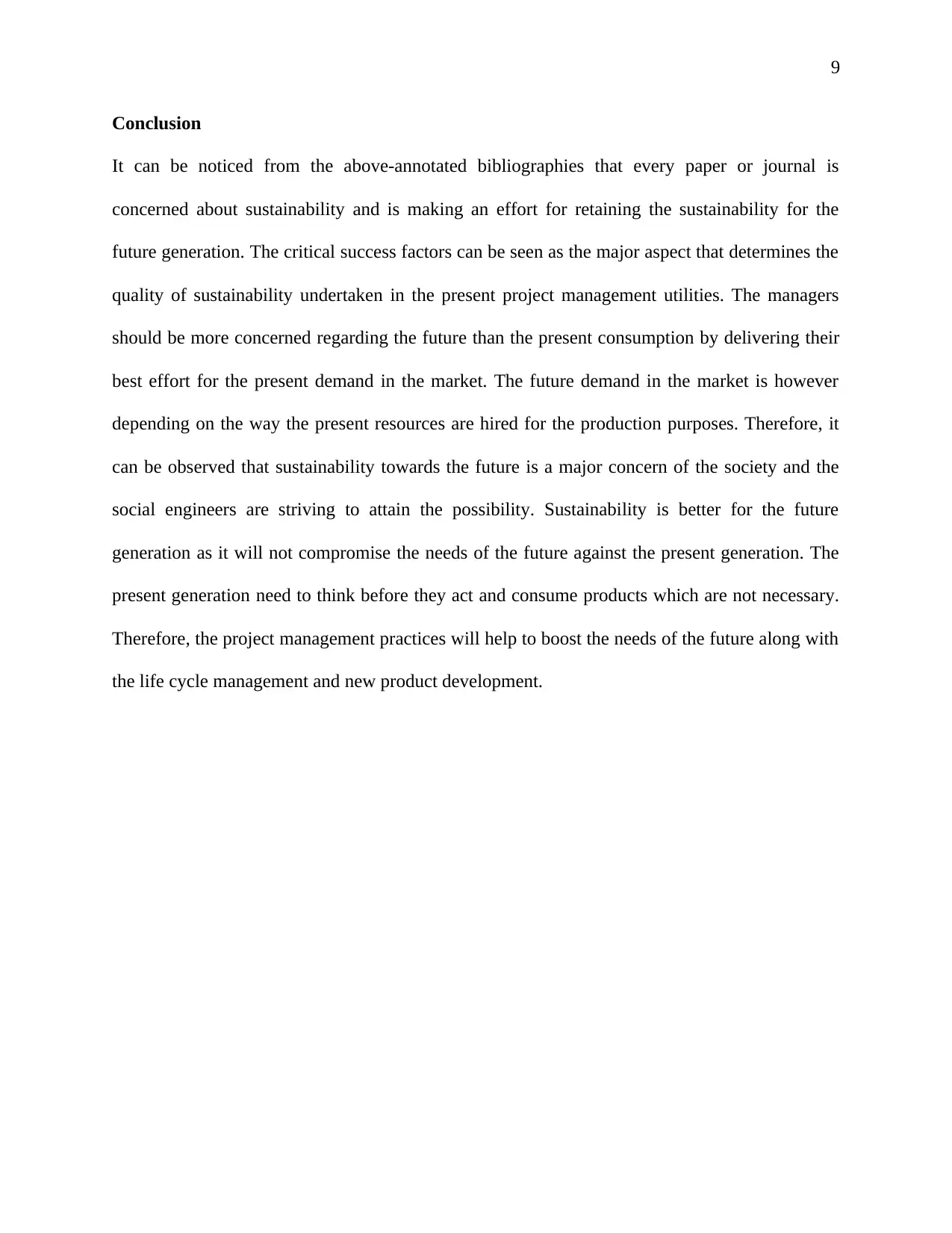
9
Conclusion
It can be noticed from the above-annotated bibliographies that every paper or journal is
concerned about sustainability and is making an effort for retaining the sustainability for the
future generation. The critical success factors can be seen as the major aspect that determines the
quality of sustainability undertaken in the present project management utilities. The managers
should be more concerned regarding the future than the present consumption by delivering their
best effort for the present demand in the market. The future demand in the market is however
depending on the way the present resources are hired for the production purposes. Therefore, it
can be observed that sustainability towards the future is a major concern of the society and the
social engineers are striving to attain the possibility. Sustainability is better for the future
generation as it will not compromise the needs of the future against the present generation. The
present generation need to think before they act and consume products which are not necessary.
Therefore, the project management practices will help to boost the needs of the future along with
the life cycle management and new product development.
Conclusion
It can be noticed from the above-annotated bibliographies that every paper or journal is
concerned about sustainability and is making an effort for retaining the sustainability for the
future generation. The critical success factors can be seen as the major aspect that determines the
quality of sustainability undertaken in the present project management utilities. The managers
should be more concerned regarding the future than the present consumption by delivering their
best effort for the present demand in the market. The future demand in the market is however
depending on the way the present resources are hired for the production purposes. Therefore, it
can be observed that sustainability towards the future is a major concern of the society and the
social engineers are striving to attain the possibility. Sustainability is better for the future
generation as it will not compromise the needs of the future against the present generation. The
present generation need to think before they act and consume products which are not necessary.
Therefore, the project management practices will help to boost the needs of the future along with
the life cycle management and new product development.
⊘ This is a preview!⊘
Do you want full access?
Subscribe today to unlock all pages.

Trusted by 1+ million students worldwide
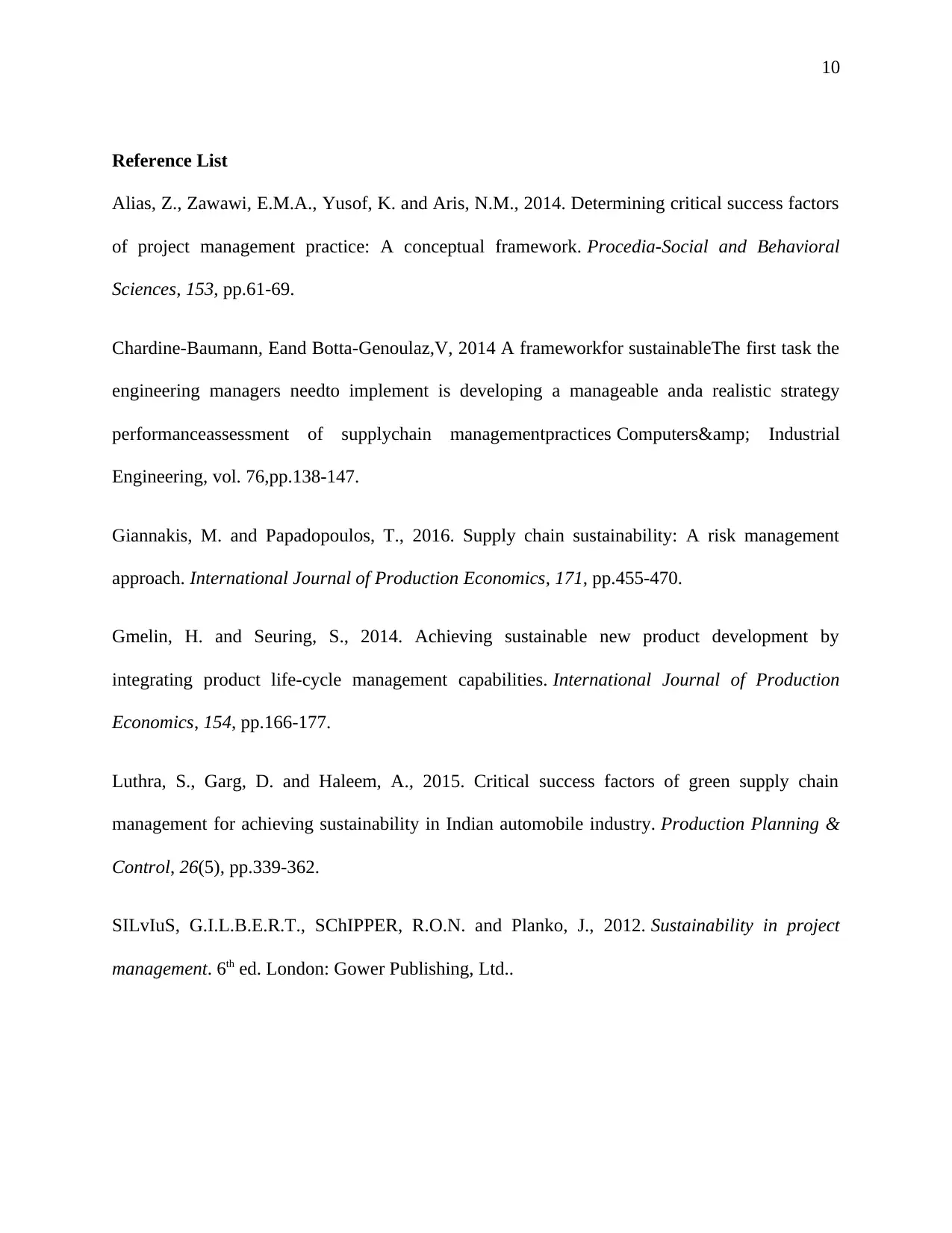
10
Reference List
Alias, Z., Zawawi, E.M.A., Yusof, K. and Aris, N.M., 2014. Determining critical success factors
of project management practice: A conceptual framework. Procedia-Social and Behavioral
Sciences, 153, pp.61-69.
Chardine-Baumann, Eand Botta-Genoulaz,V, 2014 A frameworkfor sustainableThe first task the
engineering managers needto implement is developing a manageable anda realistic strategy
performanceassessment of supplychain managementpractices Computers& Industrial
Engineering, vol. 76,pp.138-147.
Giannakis, M. and Papadopoulos, T., 2016. Supply chain sustainability: A risk management
approach. International Journal of Production Economics, 171, pp.455-470.
Gmelin, H. and Seuring, S., 2014. Achieving sustainable new product development by
integrating product life-cycle management capabilities. International Journal of Production
Economics, 154, pp.166-177.
Luthra, S., Garg, D. and Haleem, A., 2015. Critical success factors of green supply chain
management for achieving sustainability in Indian automobile industry. Production Planning &
Control, 26(5), pp.339-362.
SILvIuS, G.I.L.B.E.R.T., SChIPPER, R.O.N. and Planko, J., 2012. Sustainability in project
management. 6th ed. London: Gower Publishing, Ltd..
Reference List
Alias, Z., Zawawi, E.M.A., Yusof, K. and Aris, N.M., 2014. Determining critical success factors
of project management practice: A conceptual framework. Procedia-Social and Behavioral
Sciences, 153, pp.61-69.
Chardine-Baumann, Eand Botta-Genoulaz,V, 2014 A frameworkfor sustainableThe first task the
engineering managers needto implement is developing a manageable anda realistic strategy
performanceassessment of supplychain managementpractices Computers& Industrial
Engineering, vol. 76,pp.138-147.
Giannakis, M. and Papadopoulos, T., 2016. Supply chain sustainability: A risk management
approach. International Journal of Production Economics, 171, pp.455-470.
Gmelin, H. and Seuring, S., 2014. Achieving sustainable new product development by
integrating product life-cycle management capabilities. International Journal of Production
Economics, 154, pp.166-177.
Luthra, S., Garg, D. and Haleem, A., 2015. Critical success factors of green supply chain
management for achieving sustainability in Indian automobile industry. Production Planning &
Control, 26(5), pp.339-362.
SILvIuS, G.I.L.B.E.R.T., SChIPPER, R.O.N. and Planko, J., 2012. Sustainability in project
management. 6th ed. London: Gower Publishing, Ltd..
1 out of 10
Related Documents
Your All-in-One AI-Powered Toolkit for Academic Success.
+13062052269
info@desklib.com
Available 24*7 on WhatsApp / Email
![[object Object]](/_next/static/media/star-bottom.7253800d.svg)
Unlock your academic potential
© 2024 | Zucol Services PVT LTD | All rights reserved.





